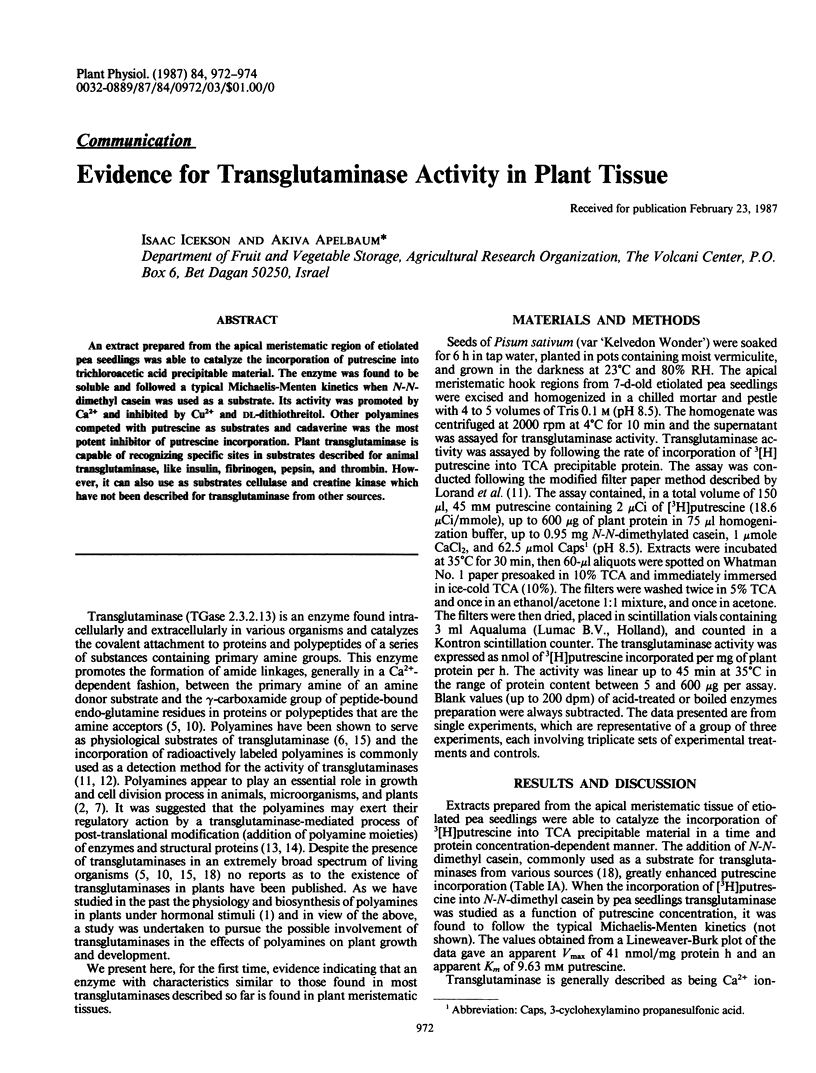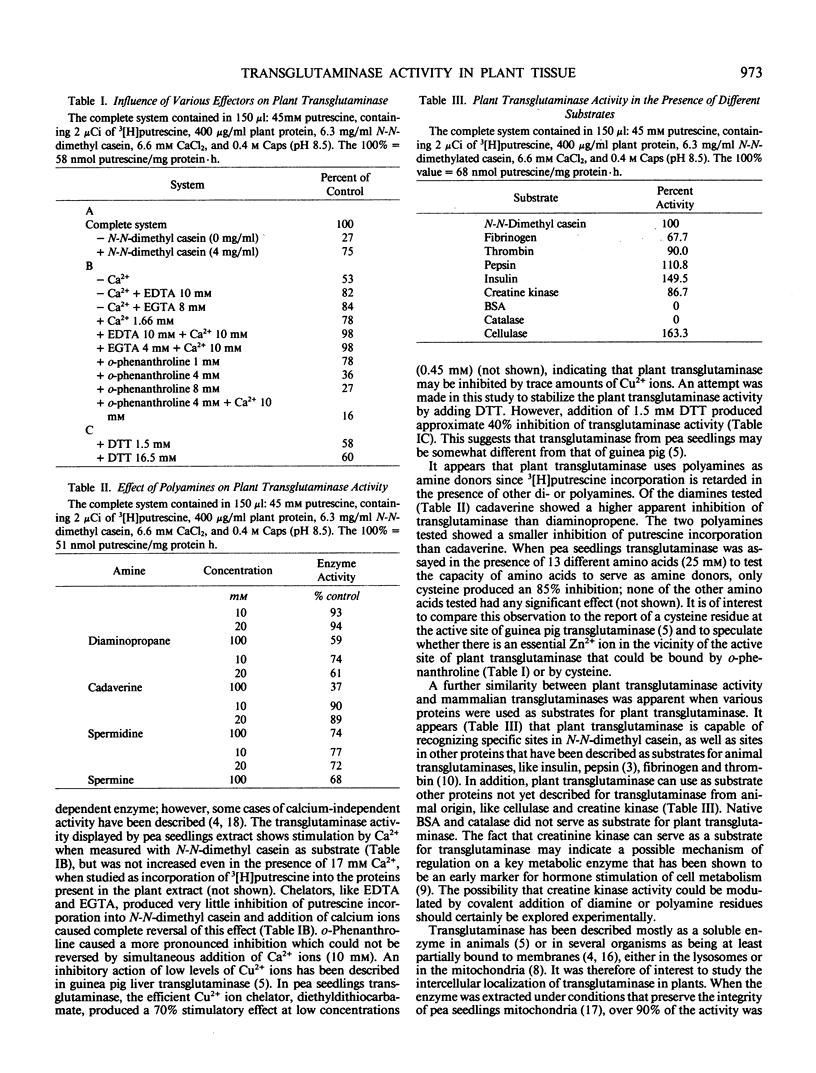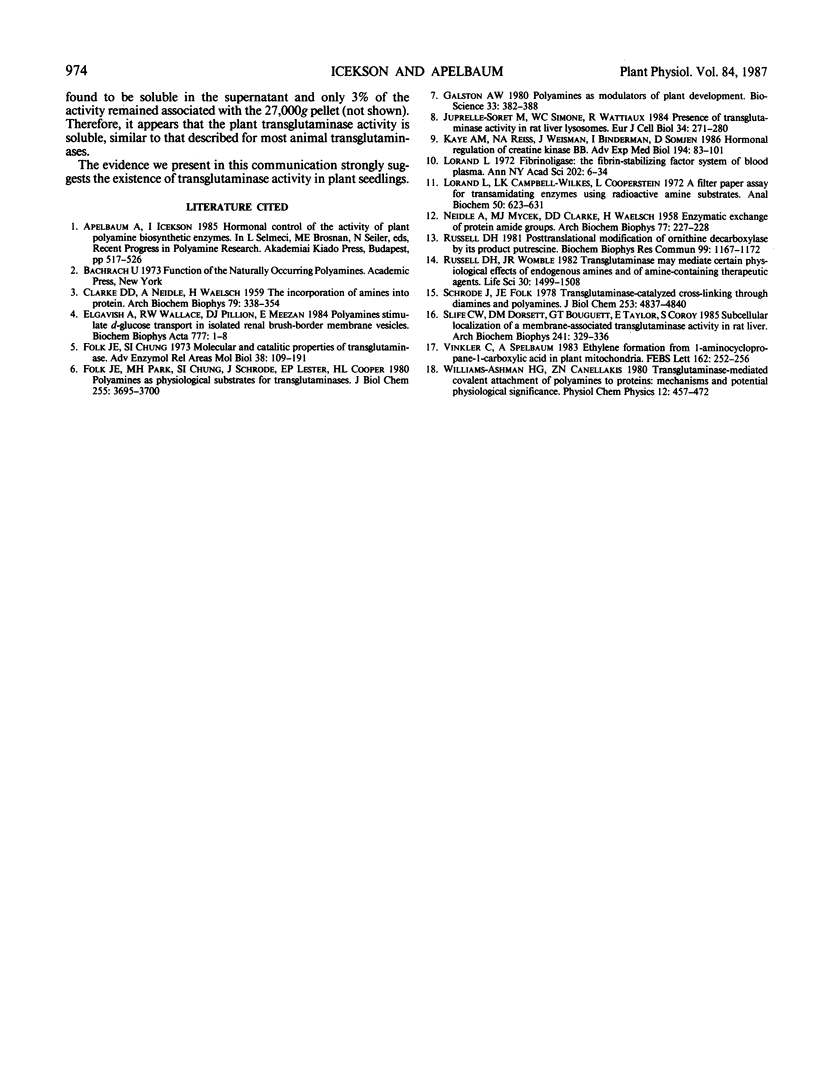Abstract
An extract prepared from the apical meristematic region of etiolated pea seedlings was able to catalyze the incorporation of putrescine into trichloroacetic acid precipitable material. The enzyme was found to be soluble and followed a typical Michaelis-Menten kinetics when N-N-dimethyl casein was used as a substrate. Its activity was promoted by Ca2+ and inhibited by Cu2+ and dl-dithiothreitol. Other polyamines competed with putrescine as substrates and cadaverine was the most potent inhibitor of putrescine incorporation. Plant transglutaminase is capable of recognizing specific sites in substrates described for animal transglutaminase, like insulin, fibrinogen, pepsin, and thrombin. However, it can also use as substrates cellulase and creatine kinase which have not been described for transglutaminase from other sources.
Full text
PDF


Selected References
These references are in PubMed. This may not be the complete list of references from this article.
- Elgavish A., Wallace R. W., Pillion D. J., Meezan E. Polyamines stimulate D-glucose transport in isolated renal brush-border membrane vesicles. Biochim Biophys Acta. 1984 Oct 17;777(1):1–8. doi: 10.1016/0005-2736(84)90490-5. [DOI] [PubMed] [Google Scholar]
- Folk J. E., Chung S. I. Molecular and catalytic properties of transglutaminases. Adv Enzymol Relat Areas Mol Biol. 1973;38:109–191. doi: 10.1002/9780470122839.ch3. [DOI] [PubMed] [Google Scholar]
- Folk J. E., Park M. H., Chung S. I., Schrode J., Lester E. P., Cooper H. L. Polyamines as physiological substrates for transglutaminases. J Biol Chem. 1980 Apr 25;255(8):3695–3700. [PubMed] [Google Scholar]
- Juprelle-Soret M., Wattiaux-De Coninck S., Wattiaux R. Presence of a transglutaminase activity in rat liver lysosomes. Eur J Cell Biol. 1984 Jul;34(2):271–274. [PubMed] [Google Scholar]
- Kaye A. M., Reiss N. A., Weisman Y., Binderman I., Sömjen D. Hormonal regulation of creatine kinase BB. Adv Exp Med Biol. 1986;194:83–101. doi: 10.1007/978-1-4684-5107-8_7. [DOI] [PubMed] [Google Scholar]
- Lorand L., Campbell-Wilkes L. K., Cooperstein L. A filter paper assay for transamidating enzymes using radioactive amine substrates. Anal Biochem. 1972 Dec;50(2):623–631. doi: 10.1016/0003-2697(72)90074-7. [DOI] [PubMed] [Google Scholar]
- Lorand L. Fibrinoligase: the fibrin-stabilizing factor system of blood plasma. Ann N Y Acad Sci. 1972 Dec 8;202:6–30. doi: 10.1111/j.1749-6632.1972.tb16319.x. [DOI] [PubMed] [Google Scholar]
- NEIDLE A., CLARKE D. D., MYCEK M. J., WAELSCH H. Enzymic exchange of protein amide groups. Arch Biochem Biophys. 1958 Sep;77(1):227–229. doi: 10.1016/0003-9861(58)90058-4. [DOI] [PubMed] [Google Scholar]
- Russell D. H. Posttranslational modification of ornithine decarboxylase by its product putrescine. Biochem Biophys Res Commun. 1981 Apr 30;99(4):1167–1172. doi: 10.1016/0006-291x(81)90741-5. [DOI] [PubMed] [Google Scholar]
- Russell D. H., Womble J. R. Transglutaminase may mediate certain physiological effects of endogenous amines and of amine-containing therapeutical agents. Life Sci. 1982 May 3;30(18):1499–1508. doi: 10.1016/0024-3205(82)90236-3. [DOI] [PubMed] [Google Scholar]
- Schrode J., Folk J. E. Transglutaminase-catalyzed cross-linking through diamines and polyamines. J Biol Chem. 1978 Jul 25;253(14):4837–4840. [PubMed] [Google Scholar]
- Slife C. W., Dorsett M. D., Bouquett G. T., Register A., Taylor E., Conroy S. Subcellular localization of a membrane-associated transglutaminase activity in rat liver. Arch Biochem Biophys. 1985 Sep;241(2):329–336. doi: 10.1016/0003-9861(85)90554-5. [DOI] [PubMed] [Google Scholar]
- Williams-Ashman H. G., Canellakis Z. N. Transglutaminase-mediated covalent attachment of polyamines to proteins: mechanisms and potential physiological significance. Physiol Chem Phys. 1980;12(5):457–472. [PubMed] [Google Scholar]


